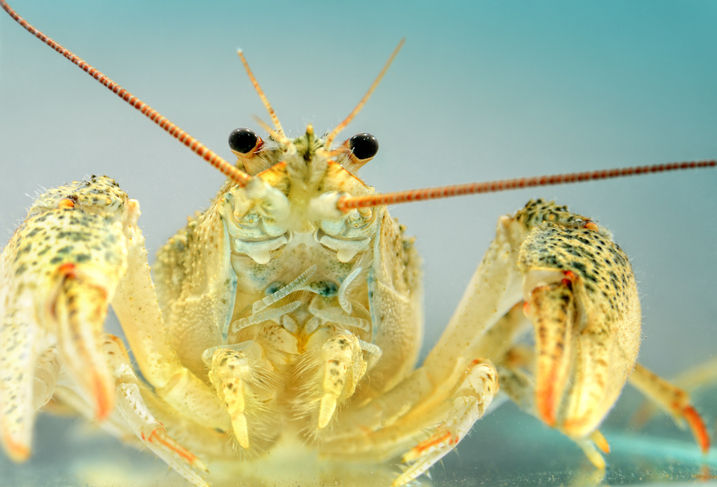Professor Culum Brown on protecting decapods in scientific research
- Feb 28, 2021
- 4 min read

It's a little known fact that live decapod crustaceans such as crabs and lobsters are used in scientific experimentation, particularly in fundamental neurological and biochemical research, and in work aimed at maximising production in the food industry. However, in the UK they currently receive no legal animal welfare protection in scientific procedures. At the end of 2020, Australia's national science agency CSIRO (Commonwealth Scientific and Industrial Research Organisation) took the groundbreaking decision to update their animal welfare procedure to include crabs, lobsters, crayfish, prawns and shrimp for the first time. This means that from 2021, all new research by CSIRO investigators using live decapod crustaceans will require approval from an Animal Ethics Committee, which will consider the welfare impacts of experiments on these animals.
We caught up with Australian marine biologist Professor Culum Brown to ask his views on this development. Based at Macquarie University in Sydney, Professor Brown is well-known globally for his work on fish cognition, behaviour, social learning, and intelligence, and for using this knowledge to argue for better fish welfare in aquaculture and fishing. He is co-editor of the book Fish Cognition and Behaviour published by Wiley-Blackwell, and Editor of The Journal of Fish Biology. In 2018, he signed Crustacean Compassion's open letter calling for the legal animal welfare protection of decapod crustaceans.
Your work is primarily in the behavioural ecology of fish, and you have been a champion of fish intelligence, emotion and sentience. The need to treat fish humanely is gaining increasing recognition. How do you feel about the expansion of concern into the sentience and welfare of other aquatic animals, such as decapod crustaceans?
It has taken a long time for the welfare of fishes to be taken seriously, but I think we're slowly getting there. The scientific evidence for sentience in decapod crustaceans is actually slowly catching up to the evidence that we have for fishes, and I think it's worth pointing out that the evidence we have the fish is just as good as it is for mammals in terms of pain perception and those kinds of things. So there's no doubt that cephalopods such as cuttlefish, octopus and squid are intelligent and sentient beings and it's pretty common these days to see them listed in animal welfare legislation. It won't be long before decapod crustaceans join them.
Many people would be surprised to learn that crabs and lobsters are often used as experimental animals in scientific research. How common is it in Australia and why might they be used over other animals?
I think it's fair to say that crabs, lobsters and shrimp are not all that widely used for scientific research. Certainly there's a little bit for aquaculture but the numbers of people who are working on decapod crustaceans in Australia is few and far between and nowhere near as many as there are people working on fishes. Nonetheless it's definitely worth considering having them listed in animal ethics legislation and it is possible to do that because a local animal ethics committee can decide whether or not to include them. There is a degree of autonomy.
Decapod crustaceans were already protected in animal experimentation under the state of Victoria’s legislation, and also at some specific Australian institutions. What is the significance of CSIRO’s decision to include decapods under the definition of ‘animal’ in their animal welfare procedure, and what difference do you hope it will make to the animals it protects?
I think the decision by CSIRO to include decapod crustaceans in their definitions of "animal" in their scientific research ethics rules is a good one. But I suspect in the near future this will be universal amongst all scientific ethics committees. If you are looking into a crystal ball it's easy to see a future where decapod crustaceans are universally protected by animal welfare legislation, and under the code for the use of animals for scientific purposes. This is the right thing to do because the evidence suggests they're capable of suffering, and we have a moral obligation to reduce suffering wherever encountered.
Why do you think decapods are not currently included in many other countries' animal experimentation laws - for example in the EU Directive 2010/63/EU or in the UK’s Animals (Scientific Procedures) Act?
Animal welfare legislation, whether it be the EU the UK or Australia, is dynamic. The rules and regulations only change when suitable scientific evidence supports change. More to the point, there has to be a common belief within the community that this is the right thing to do. Legislation after all is just the formulation of community views. The evidence for sentience in decapod crustaceans is relatively new.
Do you have any advice for other national scientific bodies who are considering whether to include decapod crustaceans under their legal animal welfare protections?
Personally I think that in the very near future the legislation will change and everyone will have to consider decapod crustaceans in their animal welfare legislations. So it's really about pre-empting political change. It's the right thing to do, and if folks can be proactive then they should be.
Crustacean Compassion's view: We believe that the UK's Animals (Scientific Procedures) Act 1986 should be updated to include decapod crustaceans in their definition of 'animal'. In the meantime, local regulatory bodies, such as university research ethics committees, should require that any research using decapod crustaceans is subject to ethical review for its impact on animal welfare. See also this article from CSIRO's Anthony Rowe on the issue.



